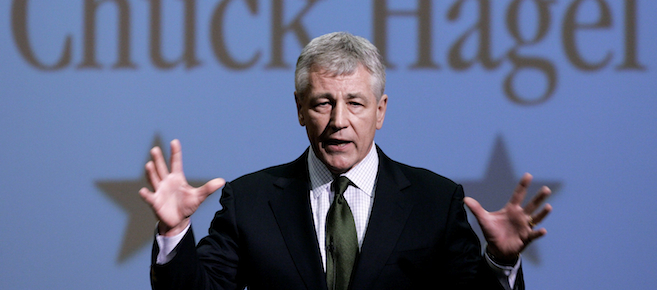Criticism of Chuck Hagel on Israel is empty and misguided
Michael Petrou on Obama’s nominee for secretary of defence
FILE – In this Feb. 21, 2007 file photo, then-Sen. Chuck Hagel, R-Neb., speaks during an appearance at Bellevue University, in Bellevue, Neb. The nomination of Hagel as the next U.S. secretary of defense is causing jitters in Israel, where the former Nebraska senator is viewed in some circles as unsympathetic and even hostile. (AP Photo/Nati Harnik, File)
Share

Chuck Hagel, President Barack Obama’s nominee for secretary of defence, is a former Republican senator, a decorated Vietnam combat veteran and, according to some of his critics, unfit to lead America’s military because of his supposedly anti-Israel and even anti-Semitic views.
Bret Stephens, writing in the Wall Street Journal, informs readers that prejudice, like cooking, has an “olfactory element” element to it, and the smell around Hagel is particularly ripe.
Hagel once said the “Jewish lobby” intimidates a lot of people in Washington. Stephens condemns this on the basis that the pro-Israel lobby is not exclusively Jewish, and because Jews are not a monolithic political bloc. Fair enough–but Stephens’ suggestion a few paragraphs later that Jewish Americans might want to re-consider their support for Obama because he’s no friend of Israel is built on the same assumption of Jewish groupthink.
Republican Senator Lindsey Graham meanwhile says Hagel would be “the most antagonistic secretary of defence towards the state of Israel in our nation’s history.” The Emergency Committee for Israel, a lobby group, has taken out television ads claiming Hagel is “not a responsible option.”
These criticisms are largely rubbish. On issues that really matter to Israelis — military aid, for example — Hagel has been consistently supportive. The Washington Post has compiled a list of Hagel’s most controversial statements on Israel. Finding proof in them that he’s some sort of closet Israel-hater requires some determined eye squinting.
More importantly, this focus on Hagel and Israel distracts from some of his views that will likely be more consequential if his nomination is approved.
Chuck Hagel is neither a neo-con Republican, nor a liberal interventionist. He’d prefer to keep American troops at home and let the world sort out its own problems. He didn’t support intervention in Libya, even when it appeared pro-government forces were prepared to slaughter their civilian opponents. Obama described Hagel as someone who knows that war is “something we only do when it’s absolutely necessary.”
Hagel did vote in favour of the Iraq war. And before that he co-sponsored a bill that would have authorized sending American ground troops to Kosovo.
But Hagel’s support for the war in Iraq was fleeting. He, like Obama, opposed the troop surge into the country, calling it “the most dangerous foreign policy blunder in the country since Vietnam.” He was wrong. The surge saved Iraq from completely falling apart and allowed Obama to withdraw American troops in a manner that didn’t reek of defeat and abandonment.
Obama himself said the surge in Iraq “succeeded beyond our wildest dreams.” This may have influenced his decision to pour thousands of troops into Afghanistan at the beginning of his presidency. Hagel opposed this, too. Fortunately for Hagel’s political prospects, Obama’s commitment to Afghanistan didn’t last that long. The President and Hagel are now in agreement that leaving Afghanistan is more important than helping to build it into something that might survive our departure.
Hagel has been called soft on Iran. He has argued against the use of military force in Iran, but changed his mind and now believes it is a viable option of last resort. He believes Iran should be engaged. So did Obama, years ago. It didn’t work, and the President has now moved on to ever-tighter sanctions. Hagel opposes these, which shows a lack of judgment — especially as sanctions, if successful, would make a military strike on Iran less likely.
Hagel has also argued for engagement with Hamas, the Palestinian militant group that runs the Gaza Strip. This, too, has earned him scorn from the right. There is a case to be made for shunning the group. It blows up buses, oppresses Palestinians under its control, sends rockets against Israeli civilians, and is a barrier to any hopes for a negotiated two-state solution in Israel and Palestine. The credibility Hamas would gain from any sort of contact with the United States would bolster it, to the detriment of Fatah, the more moderate group that governs Palestinian areas of the West Bank.
Yet the fact remains that Israel has negotiated with Hamas when it considered it necessary. And according to a Hamas member I interviewed in 2008, the group had also been in contact with officials from the U.S. State Department during the George W. Bush presidency. This isn’t to say that engaging Hamas is wise — only that partisans who condemn the idea can be hypocrites.
Chuck Hagel is what’s often called a realist. I don’t particularly like the term because it implies a hard-headed wisdom that too often justifies American isolationism in the face of potential humanitarian disasters, such as during the uprising in Libya; and because I don’t think withdrawing from places like Afghanistan and hoping doing so won’t come back to haunt us, again, is all that realistic. But in this sense, Hagel’s views are aligned with Obama’s. The President believes America’s ability to shape the world is limited. Hagel isn’t going to counsel him otherwise.